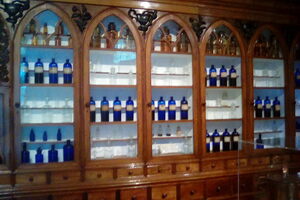Museum of the Central Hospital of Porto in Porto, Portugal

The hospital at the University of Porto has operated for more than 200 years. After the recent addition of a modern medical facility, part of the hospital has been turned into a museum celebrating and exploring the history of health and medicine in Portugal.
Its earliest iteration was an isolation hospital, which housed patients in temporary wooden huts that were burned down when the epidemic was over. For many years it was used for the treatment of tuberculosis. Much later an impressive stone facaded hospital, designed, in the Palladian, style by English Architect John Carr, who also designed The Crescent at Buxton. It was built between 1790 and 1864, and the building is now attached to a modern hospital to the rear. The old building was called the Hospital de Santo Antonio.
When the hospital’s historic pharmacy was set to close, hospital management decided to create a small museum. As well as dispensing, the pharmacy used to manufacture its own medicines. In the past these were often based on herbal medicines. However more recently they also manufactured blood products such as serum. The museum is in two rooms with the main one being the former dispensary which issued medication both to the hospitalized patients and to the general public. Here you will see examples of drugs in their old storage jars. Many of the compounds used would be considered too toxic for use today.
The second room is a small manufacturing area with a tablet press and other artifacts including a small autoclave for sterilization of various small items, microscopes, balances, and a set of plasma drip bottles. Here, you can watch a short video about the hospital and the origins of the museum.
Not a large museum but certainly worth the half hour it takes to have a good look round.





